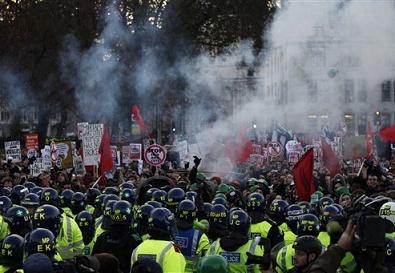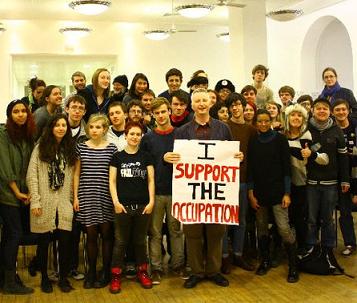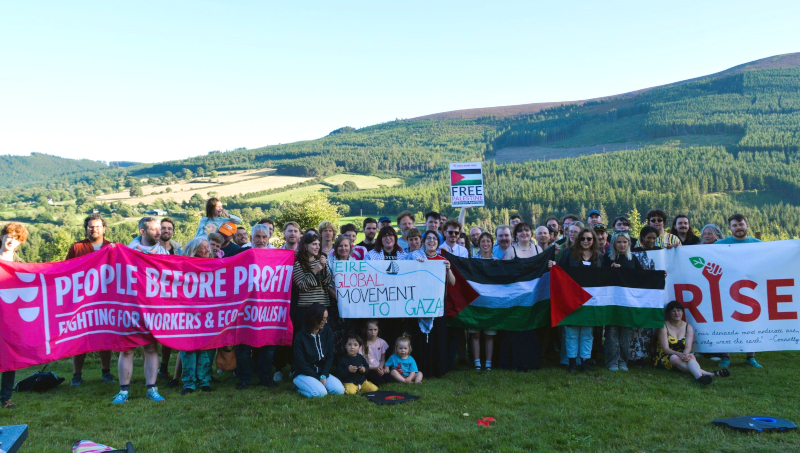Student Protests and the Emerging Discontent of Youth
The “iPod generation” have long been written off as apathetic, pampered wasters; a collection of illiterate Nathan Barleys draining their parents resources. Yet, from the storming of Tory HQ to campus occupations across the country, it is those same youth now leading public resistance to the Coalition’s cuts. The tripling of tuition fees is unquestionably serious, but it represents only a small part of the problems facing Britain’s young. An increasing awareness of generational imbalances, inflamed by [Chancellor of the Exchequer] George Osborne‘s austerity measures, could see student protests snowball into a wider movement of youth discontent.
Generational politics is undoubtedly on the rise. This year has already seen the publication of two books on the subject: David Willett’s The Pinch… and the indispensable Jilted Generation by Ed Howker and Shiv Malik. Though both texts are cautious in directing blame, they set out solid and well sourced arguments for a nation that has lost touch with generational obligations. From housing and PFi to pensions and education, the picture that emerges is one of rampant asset stripping from both past and future. The primary losers, throughout, are young people.

High Cost of Housing
Nowhere is the divide between young and old more stark than on the issue of housing. In over 60% of local authority districts, buying a home is unaffordable for those on average salary. Fuelled by the opening up of the buy-to-let market and the supply of easy credit, average house prices more than tripled between 1997 and 2009 (Jilted Generation). In terms of generational share, the proportion of homeowners aged 34 or under has declined from 51% in 1990 to just 29% in 2010. Young people have been effectively priced out of the market. Far from this being a cause of concern, ballooning house prices were endlessly cheered.
This leaves the majority of the young renting, predominantly in the private sector where the under 35s now make up over 50% of tenants (ibid). In contrast to either home ownership or renting from the social sector, private tenants not only pay considerably more for their home but also suffer the insecurity of the modern tenancy agreement. Once a twelve month contract expires, you can be moved on with a mere two months notice. From a generational perspective, whose mortgages are these tenants funding?
In the boom years, buy-to-lets could be secured with as little as an 11% deposit. Combined with a favourable tax regime, this was the ideal market for the asset rich boomers but disastrous for young people. The extensive social housing constructed in the post-war years was largely sold off under Thatcher’s ‘right to buy,’ moving the nation’s assets from public to private hands. The failure to replenish the stock of social housing is another significant contributor to the current housing shortage. What was inherited was not passed on.
“Flexible” Labour Market
The move to a “flexible” labour market has also caused particular problems for young people. The term is a generous euphemism for depressed wages and low job security, facilitated by the globalised flow of labour and industry-friendly employment reforms. Consequently, there is little incentive to train staff or offer apprenticeships; these costs are instead offloaded onto employees themselves and the taxpayer in general. The number of apprenticeships available has duly plummeted. Earlier this year, a BT scheme received 24,000 applications for just 221 positions.
In this “so called” recession, job losses among young people have risen faster than any other age group leaving nearly a million 16-24 year olds currently unemployed (BBC). Swelling the bottom end of a labour market is undoubtedly good for both business and the well-off, who benefit from cheaper costs and prices, but it is the young and the low-waged who are hit hardest. The generational spread of wealth has grown increasingly lopsided: the baby boom generation now own a full half of the country’s property and assets; the under 45s own less than a tenth.
With the tripling of tuition fees, educational costs are now being transferred from state to individual almost in their entirety. Having inherited a system which recognised higher education as a public good, and hence paid for publicly, what has been passed on is a system in which many students will repay nearly £40,000, and many poorer students will be dissuaded from going entirely. This ‘Cabinet of millionaires’ are now forcing others to pay for what they themselves received for free.
In contrast, the older generation wield substantial electoral power and are wooed accordingly. They are pursued with free bus-passes, free TV licenses and, most prized of all, a ring-fenced NHS budget – the NHS is overwhelmingly used by older people. To ice the cake of discontent, many new NHS hospitals have been built under thirty year PFi contracts; they will largely be paid for by the young, at exorbitant prices. Having run out of existing assets to sell off, the extensive programme of PFis represents a £200bn credit card with repayments stretching to the middle of the century. Add this to the looming pension crisis and the picture becomes serious indeed; the scale of liabilities being passed on is breathtaking.
The recurring theme is that of a failure of reciprocity. What was enjoyed by one generation should be protected for the next; this debt to posterity has in many areas been squandered. Generational friction is not an attractive prospect, and nor is it fair to tar a whole generation for these emerging imbalances. But regardless, there are issues here that need addressing, issues that jar against a basic sense of fairness. With widespread youth unemployment, crippling national debt and a tightly contracting state, tensions could easily heighten. What began with a march on Millbank could soon grow into something far more sweeping. •
This article first published by New Left Project.
Inside the UCL Occupation
Edward Lewis, Maeve Mckeown
Maeve Mckeown is a Political Theory PhD Student at University College London and has been a participant in UCLOccupation since it began over two weeks ago. She gave Edward Lewis an insider’s account of the UCL occupation, increasingly seen as a vital hub of the student movement.
Edward Lewis (EL): Why did you decide to occupy? And how did you go about doing it?
Maeve Mckeown (MM): On 24 November I gathered with the other students in UCL who opposed the education cuts, in the quad. I expected to join the national demo in Trafalgar Square. Instead, we decided to have a march around UCL campus. The first room we marched into was the Jeremy Bentham Room. Almost spontaneously we decided to stay there and occupy it. We’ve now been here for two weeks!

The occupation was immediately well-organised. A few occupiers that had been involved with Climate Camp suggested we start up working groups. We started groups for media, security, kitchen and demands. The groups got to work straight away. We fed back that night at our first General Meeting, which lasted an achingly long 4 hours. But the process was set in place and we’ve operated this way ever since.
EL: How many people have been involved in the occupation so far?
MM: It’s hard to say because people can come and go. But there are around 200 that are regularly involved.
EL: How has the university management responded to your demands and to the occupation generally? How have you managed your interaction with the management?
MM: We have been in negotiations with management from early in the occupation. These are ongoing and I can’t really comment on the situation.
EL: What has been the reaction of other students and staff at UCL to the occupation? Is there broad support? Is there any hostility?
MM: The staff have been very supportive. We’ve had lectures from the English, Geography and Architecture departments. We have a staff petition with hundreds of signatures (they haven’t been totalled up yet!). We’ve also had UCU reps from UCL here everyday. In terms of other students, we had an Emergency General Meeting of the students’ union on Monday, where it was voted by an overwhelming majority that the union should support the occupation. Many people were turned away, but anecdotally it seemed like they were also supportive. There is due to be a referendum of the students next week and I am confident we will win.
EL: What do you think led to Aaron Porter’s eventual support for the occupation? How significant is it that the president of the NUS is endorsing this kind of activity?
MM: There was quite a lot of pressure put on Aaron Porter. The occupations around the country started without NUS support and have been leading the way in student politics. He had to catch up with us. We wanted NUS support but the occupations would have continued about it. Unless Porter comes good on his promise of legal support and to help organise protests, the NUS endorsement will have largely symbolic value.
EL: More generally, what impact do you think the occupations have had?
MM: I think the occupations have had a huge impact. There seems to be a view of students that they are apathetic consumers, with no knowledge of, or interest in, politics. These occupations have completely dispelled that myth. So in terms of perceptions of young people, I think it represents a paradigm shift. In terms of politics, it seems that Browne’s proposals will pass in Parliament. Obviously I hope that won’t happen! But if it does it proves that the government is still failing to listen to mass protests, as the Labour government did with Iraq. But because the public sector cuts are an ongoing and domestic issue, I think dissent will increase and intensify. The occupations have inspired people and showed them that when you organise it is possible to make your voice heard.
EL: Tell us more about your internal organising practices, and about how you are coordinating with other student groups and occupations.
MM: We are organised in working groups that work on a specific issue and then feedback to the General Meetings. Nothing can happen without achieving consensus with the whole group. This can lead to some long meetings! We are in contact with other occupations and groups via social networking on the internet. Also, delegates from occupations across the country have come here and we have sent delegates out. We are in constant contact with the other occupations.
EL: Has carrying out the occupation had an effect on the participants? Has it been in some sense a ‘consciousness raising’ experience?
MM: Yes definitely. I was radical before the occupations and now I’m even more radicalised! I think for students who have been involved and weren’t particularly politicised before, it’s been a life changing experience. I’ve learnt a lot about consensus politics, negotiating with people in positions of power, and promotion of social movements.
EL: What have you found most surprising or unexpected about the experience?
MM: I’ve been surprised at how many students have been involved. There was a feeling that UCL students in particular were quite conservative, but that has been blown out of the water. I was surprised at how tiring and how much work it would be! The occupation has been intense. I’ve basically ditched my life for two weeks – haven’t seen any friends, done any work, or anything apart from occupation-related activities!
EL: Since the ‘Green revolution’ in Iran there has been a big debate about how effective social media are to social movements seeking to outmanoeuvre state authority. How has your occupation used Twitter, Facebook, etc.? And how effective have they been?
MM: One of the first things we did was set up Twitter and Facebook accounts and a blog. We have over 3000 followers on twitter and several people within the occupation who retweet and pass on information. Social networking is how we’ve got in touch with other students and groups. We have tweeted from all the protests and it’s been the best way of keeping people informed about what we’re doing.
EL: If the government is successful in the vote to raise tuition fees on Thursday, this will undoubtedly have a demoralising impact on the student movement. How can it respond effectively?
MM: We are mentally prepared for that! I realise it will be demoralising but I think it’s just going to make us more angry. There’s already discussion happening about what we should do in January and beyond.
EL: Occupations have taken place in an impressive number of universities throughout the country. However, it is only a significant minority that has taken such action, and we have yet to see any occupations of FE colleges or schools. What advice would you give to other students who are attracted to the idea of occupying buildings but aren’t sure of how to do it or how worthwhile it would be?
MM: More occupations are happening everyday. Occupations have just been announced in Glasgow, Birkbeck and Exeter. I would say to people just do it! It’s incredibly fun! But it has also been effective, and if we can get occupations going all over the country in different sectors, it will really give the government something to get worried about. •





